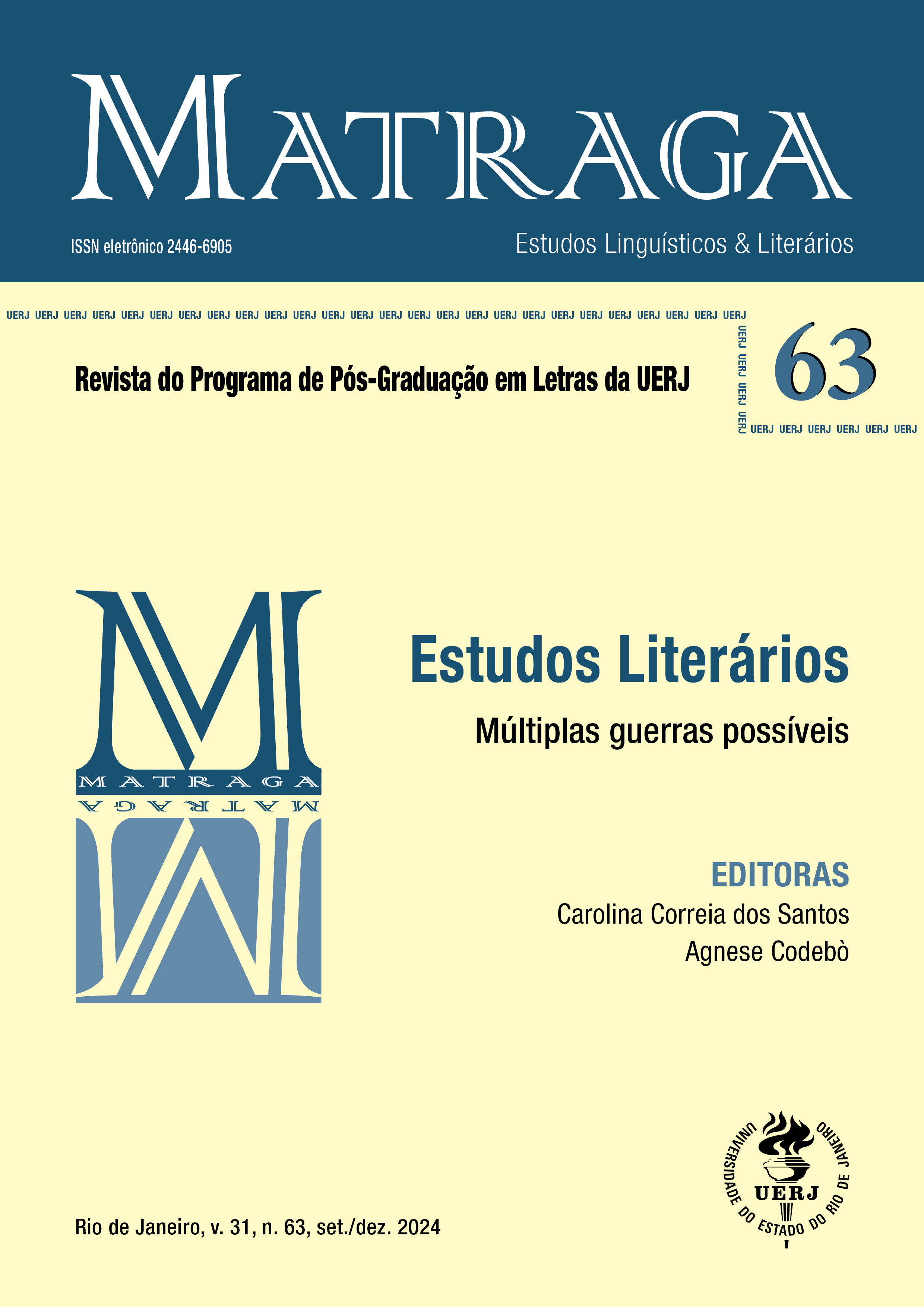A arqueologia da alma: o múltiplo como vetor ontológico de tempo e existência na obra A guerra não tem rosto de mulher, de Svetlana Alexsiévitch
DOI:
https://doi.org/10.12957/matraga.2024.83219Palavras-chave:
Guerra, Tempo, Existência, Múltiplo, ExperiênciaResumo
O presente trabalho tem como objetivo investigar a questão do múltiplo na obra – A guerra não tem rosto de mulher, de Svetlana Aleksiévitch –, assumindo como perspectiva de análise um ângulo ontológico voltado aos múltiplos “eu” que vivenciam a guerra. Para alcançar esse objetivo, o trabalho aprecia uma intercessão entre dois operadores utilizados pela autora: tempo e existência. De um lado, uma dimensão temporal que se estende por um eixo horizontal, revelando uma permanência do “eu”, que transcorre por três cenários cronológicos distintos – o antes, o durante e o após a guerra. De outro lado, um eixo vertical acessível por estratos, compreendendo a existência de múltiplos “eu” que coabitam o estar na guerra. O que é indicativo de um estar no mundo marcado por um desespero fundamental, em que o sujeito é posto em confronto direto com distintas versões de si – o soldado, o homem e o animal. A ideia central, portanto, é a de problematizar como antes de narrar múltiplas guerras, a autora inspeciona múltiplas versões do “eu”; versões estas que ganham espaço, conforme a intensidade do fenômeno bélico avança. Quanto à presença de uma experiência ontologicamente autêntica, essa se revela a partir de uma contemplação do ser, algo em torno da capacidade do próprio “eu”, brevemente, suspender tempo e espaço e se reconciliar consigo e com a natureza.
Downloads
Referências
AGAMBEN, Giorgio. Homo sacer: Sovreign Power and Bare Life. California: Stanford University Press, 1998.
ALEKVIÉVITCH, Svetlana. A guerra não tem rosto de mulher. São Paulo: Companhia das Letras, 2016.
ALEKVIÉVITCH, Svetlana. O fim do homem soviético. São Paulo: Companhia das Letras, 2016.
BENJAMIN, Walter. Magia e técnica, arte e política: ensaios sobre literatura e história da cultura. São Paulo: Brasiliense, 1994.
BLUMENBERG, Hans. Teoria da não conceitualidade. Belo Horizonte: Editora UFMG, 2013.
CAVALCANTI, Márcia Sá. A perplexidade da presença. In: HEIDEGGER, Martin. Ser e Tempo. Petrópolis: Editora Vozes, 2024.
CORNELSEN, Élcio; BURNS, Tom. Literatura e guerra. Belo Horizonte: Editora UFMG, 2010.
FELMAN, Shoshana. In a Era of Testimony: Claude Lanzmann’s Shoah. Yale French Studies, nº 79, Literature and the Ethical Question, 1991.
FREUD, Sigmund. O mal-estar na civilização, novas conferências introdutórias e outros textos (1930- 1936). Vol. 18: Obras Completas. São Paulo: Companhia das Letras, 2010.
DERRIDA, Jacques. Geschlecht, différence sexuelle, différence ontologique. In: HAAR, Michel. L’Herne Martin Heidegger. Paris: Éditions del’Herne, 1983.
DERRIDA, Jacques. O animal que logo sou. São Paulo: Editora da UNESP, 2002.
HEIDEGGER, Martin. El Ser y El Tiempo. México: Fondo de Cultura Economica, 1986.
HUSSERL, Edmund. ldées directrices pour une phénoménologie. Tomo 1: Introduction générale à la phé¬noménologie. Paris: TEL-Gallimard, 1991.
JÜNGER, Ernst. Mobilização total. Revista Natureza Humana, São Paulo, V.4, nº1, jun.2002.
KIERKEGAARD, Sören. O desespero humano. São Paulo: Editora UNESP, 2010.
KOSELLECK, Reinhart. Sediments of Time: on Possible Histories. California: Stanford University Press, 2018.
LEÃO, Emmanuel Carneiro. A propósito de Édipo – Ser e não ser no vir a ser Édipo do homem de Píndaro e Freud. In: Revista Tempo Brasileiro, jan.- mar. – n 180, Rio de Janeiro, 2010.
LEÃO, Emmanuel Carneiro. Posfácio. In: HEIDEGGER, Martin. Ser e Tempo. Petrópolis: Editora Vozes, 2024.
RAMOS, Maria Luiza. Fenomenologia da obra literária. Belo Horizonte: Editora UFMG, 2011.
SEBALD, W. G. Guerra aérea e literatura. São Paulo: Companhia das Letras, 2011.
SOARES, Leonardo Francisco. Leituras da outra Europa: Guerras e memórias na literatura e no cinema da Europa Centro-Oriental. Belo Horizonte: Editora UFMG, 2012.
TODOROV, Tzvetan. Teoria da literatura. Lisboa: Edições 70, 1987.
WEBBER, Andrew. The Doppelgänger: Double Visions in German Literature. Oxford: Claredon Press, 1996.
Downloads
Publicado
Como Citar
Edição
Seção
Licença

Este trabalho está licenciado sob uma licença Creative Commons Attribution-NonCommercial 4.0 International License.
AUTORIZAÇÃO
A Matraga – Revista do Programa de Pós-Graduação em Letras da UERJ está autorizada a publicar o artigo ora submetido, caso seja aceito para publicação online. Fica atestado que a contribuição é original, que não está sendo submetida a outro editor para publicação, e que a presente declaração é a expressão da verdade.
Os trabalhos publicados no espaço virtual da Matraga – Revista do Programa de Pós-Graduação em Letras da UERJ serão automaticamente cedidos, ficando os seus direitos autorais reservados à Matraga. Sua reprodução, total ou parcial, é condicionada à citação dos autores e dos dados da publicação.

A Matraga utiliza uma Licença Creative Commons - Atribuição-NãoComercial 4.0 Internacional.





